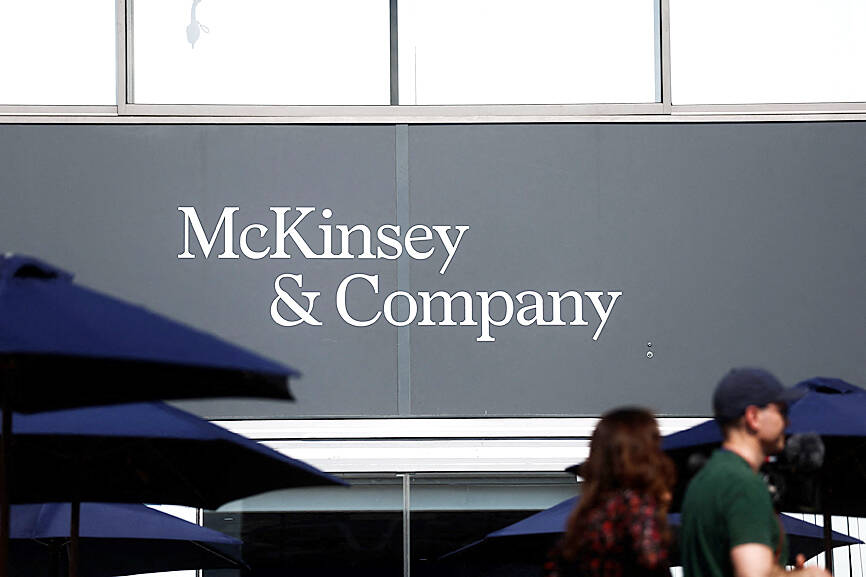McKinsey & Co has warned about 3,000 of the firm’s consultants that their performance was unsatisfactory and would need to improve.
The firm gave these employees a so-called “concerns” rating as part of their performance reviews in the past few months, people familiar with the matter said. With that rating, employees are typically given about three months to show improved performance. If they are unable to do so, the firm might begin counseling some of them to leave the company entirely.
While the proportion of staffers receiving the “concerns” rating is largely in line with past years, the firm’s headcount has swelled so dramatically in the past few years, meaning that the ratings have been handed to far more employees than in prior periods, people familiar with the matter said.

Photo: REUTERS
McKinsey’s headcount has swelled to about 45,000 employees, up 60 percent from the 28,000 employees it had in 2018.
“Our proportion of concerns ratings is consistent with our historical range,” a McKinsey spokesperson said in an e-mailed statement. “It is not an unprecedented year. The performance evaluation process we have today also remains consistent with years past.”
It is the latest sign that the consulting industry is pulling back after the boom times of the COVID-19 pandemic spurred hiring sprees across the industry.
Some of the world’s largest consultancies have said a growing number of clients are shelving longer-term investments as they navigate an uncertain macroeconomic environment, meaning there is less work for their consultants to come in and advise companies on.
For instance, Accenture PLC last year said it would slash 19,000 jobs. Ernst & Young LLP in December last year said it was cutting jobs and delaying start dates for some new hires across the US, while PricewaterhouseCoopers LLP in November last year launched a voluntary redundancy program with the bulk of those cuts aimed at the advisory division.
For its part, McKinsey embarked on a plan to eliminate about 1,400 roles last year. It was an unusual move for the consulting giant, which rarely carries out job cuts in its own ranks.
Instead, underperforming employees in client-facing roles tend to depart after being “counseled to leave” — a phrase that indicates the company recommends that they try to find a different employer.
“A core part of our mission is helping people learn and grow into leaders, whether they stay at McKinsey or continue their careers elsewhere,” the McKinsey spokesperson said in the statement. “This is why we are widely recognized as one of the best places for talent to learn and develop.”
McKinsey said this month that the firm’s 700 senior partners re-elected Bob Sternfels as global managing partner for a second and final three-year term. Last year, Sternfels led McKinsey to a record US$16 billion in revenue.
The consultancy was founded 98 years ago and has grown to employ 30,000 consultants around the world — a figure that includes more than 2,900 partners. The firm has offices in more than 60 countries around the world and has 4,400 active engagements.

UNCERTAINTIES: Exports surged 34.1% and private investment grew 7.03% to outpace expectations in the first half, although US tariffs could stall momentum The Chung-Hua Institution for Economic Research (CIER, 中華經濟研究院) yesterday raised its GDP growth forecast to 3.05 percent this year on a robust first-half performance, but warned that US tariff threats and external uncertainty could stall momentum in the second half of the year. “The first half proved exceptionally strong, allowing room for optimism,” CIER president Lien Hsien-ming (連賢明) said. “But the growth momentum may slow moving forward due to US tariffs.” The tariff threat poses definite downside risks, although the scale of the impact remains unclear given the unpredictability of US President Donald Trump’s policies, Lien said. Despite the headwinds, Taiwan is likely

When Lika Megreladze was a child, life in her native western Georgian region of Guria revolved around tea. Her mother worked for decades as a scientist at the Soviet Union’s Institute of Tea and Subtropical Crops in the village of Anaseuli, Georgia, perfecting cultivation methods for a Georgian tea industry that supplied the bulk of the vast communist state’s brews. “When I was a child, this was only my mum’s workplace. Only later I realized that it was something big,” she said. Now, the institute lies abandoned. Yellowed papers are strewn around its decaying corridors, and a statue of Soviet founder Vladimir Lenin

UNIFYING OPPOSITION: Numerous companies have registered complaints over the potential levies, bringing together rival automakers in voicing their reservations US President Donald Trump is readying plans for industry-specific tariffs to kick in alongside his country-by-country duties in two weeks, ramping up his push to reshape the US’ standing in the global trading system by penalizing purchases from abroad. Administration officials could release details of Trump’s planned 50 percent duty on copper in the days before they are set to take effect on Friday next week, a person familiar with the matter said. That is the same date Trump’s “reciprocal” levies on products from more than 100 nations are slated to begin. Trump on Tuesday said that he is likely to impose tariffs

READY TO BUY: Shortly after Nvidia announced the approval, Chinese firms scrambled to order the H20 GPUs, which the company must send to the US government for approval Nvidia Corp chief executive officer Jensen Huang (黃仁勳) late on Monday said the technology giant has won approval from US President Donald Trump’s administration to sell its advanced H20 graphics processing units (GPUs) used to develop artificial intelligence (AI) to China. The news came in a company blog post late on Monday and Huang also spoke about the coup on China’s state-run China Global Television Network in remarks shown on X. “The US government has assured Nvidia that licenses will be granted, and Nvidia hopes to start deliveries soon,” the post said. “Today, I’m announcing that the US government has approved for us